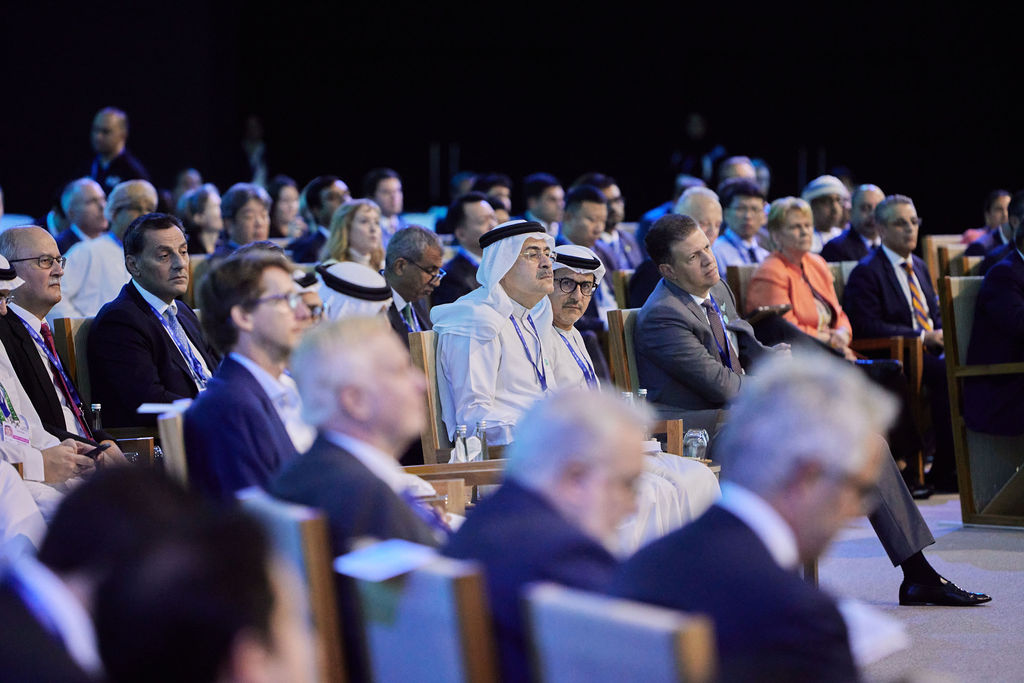Foreword by the CEO Champions:
Mobilizing the Industry
On December 03, 2023, during COP281, more than 50 companies that together account for 43% of the world’s upstream oil production signed the Oil & Gas Decarbonization Charter (OGDC or the Charter): a pledge to take concrete steps to accelerate the decarbonization of the industry.
By joining the Charter, an unprecedented number of oil and gas companies have agreed to work toward achieving the following aims:
- Net-zero operations by or before 2050;
- Aiming for near-zero upstream methane emissions by 2030;
- Zero routine flaring by 2030;
- If not already shared publicly, set and share 2030 Scope 1 & 2 emissions2 ambitions.
Additionally, signatories recognize the need to:
- Report on progress, in accordance with internationally recognized frameworks;
- Collaborate on reducing Scope 1 & 2 emissions and share environmental best practices (in compliance with legal best practices);
- Invest in the energy systems of the future.

Charter members recognize that climate change is a serious threat to the planet. The transition to low-carbon emissions energy systems is gaining pace. However, with the continued rise of energy demand, particularly from emerging markets, forecasts suggest that oil and gas will remain part of the energy mix for the foreseeable future, playing an important part in delivering energy security and affordability.
This is why it is vital that the industry meets the world’s needs while taking steps to decarbonize the energy systems of today. Oil and gas companies have an important role to play in investing in – and deploying – the technologies and solutions that will ensure a cleaner tomorrow: from electrification; low-carbon emissions fuels; solar and wind power; to low-carbon hydrogen; carbon capture and sequestration (CCS); energy storage and carbon-negative emissions innovations such as direct air capture.
Together, we have the opportunity to make a real difference, and have positive impacts in support of the aims of the Paris Agreement. Reducing operational oil and gas emissions alone could cut global greenhouse gases significantly.
One of the most game-changing steps the sector can take in the short term is to curb emissions of methane, a potent greenhouse gas. Given that the oil and gas industry is estimated to be the source of nearly a quarter of the world’s methane emissions, achieving the Charter’s objectives to reduce this to near-zero and stop all routine flaring will contribute significantly to the global climate effort.
The Charter offers a framework that can help guide the industry towards a net-zero operations future. Success depends on two factors: the emissions reduction efforts of each individual signatory;and effective collaboration among signatories and across the industry at large. We face a collective challenge – one that demands a global and inclusive response.
We are proud of the 54 companies that have already signed up to the Charter and are encouraged by the extent of their engagement.
Each is at a different phase of its journey. For some, the Charter reflects existing commitments and aligns with pledges already made via other initiatives. For others, it marks their first steps toward climate action.
The disparate nature of our membership offers advantages as well as challenges. Because each company brings to the endeavor different experiences, capabilities, stakeholders and national circumstances, signatories will have the opportunity to learn from the best practices and insights of peers with a wide range of backgrounds – and from across the globe.
Since its launch at the end of 2023, the Charter has built a robust operating structure and established itself as a hub of valuable knowledge and guidance for signatories, the broader industry and external stakeholders.
To lay the groundwork essential for successful cooperation – and to establish a base upon which to build future success – the OGDC has also undertaken a key voluntary data-gathering exercise, asking signatories to share information about where they stand in relation to Charter aspirations. For some, it was the first time ever sharing data on climate actions.
1 COP28 refers to the 2023 United Nations Conference of the Parties of the UNFCCC on Climate Change.
2 As defined by the Greenhouse Gas (GHG) Protocol Corporate Standard (2019).

However, this is only the beginning.
Under the guidance of the Oil and Gas Climate Initiative (OGCI), now acting as its Secretariat, over the next year the OGDC will expand its emissions reduction toolbox, adding new resources to help signatories shape their net-zero operations roadmaps and increase data quality and visibility.
It will also continue to track the progress of all signatories toward the goals set out in the Charter. A natural focus in 2025 will be to encourage those that have not yet set interim emissions targets to do so, offer support where needed and share collective progress at the 2025 UN Climate Change Conference (UNFCCC COP30).
Since launch at COP28 we have welcomed three new signatories in China, India and Norway and encourage more to join us on this collective journey.
Since 2017, members of the OGCI have reported a cumulative 55% reduction in operated upstream methane emissions and a 21% reduction in upstream carbon intensity3.
This is clear evidence of the progress that can be achieved when a collective of oil and gas companies, committed to a cleaner future, works together to deliver rapid climate action at scale.
3 Please note that DNV, an independent energy expert and assurance provider contracted to provide a third-party assurance statement verifying OGDC data submission, was not involved in the OGCI reporting and verification processes.


